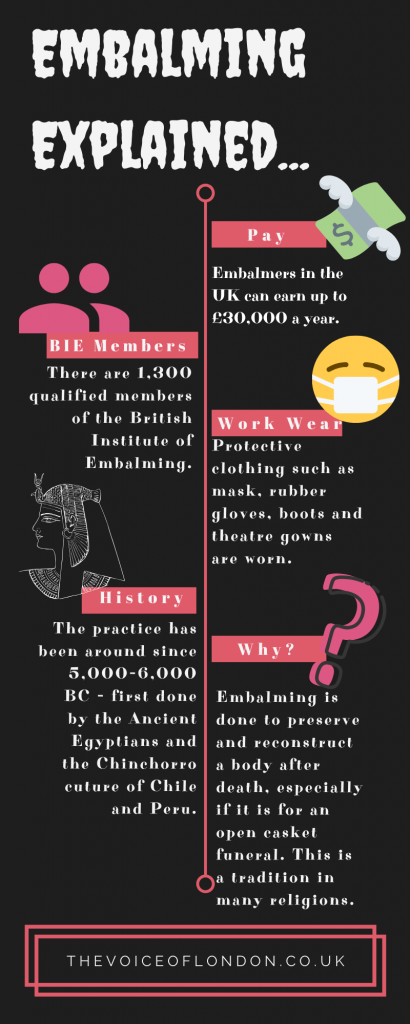Embalm:
(Em-Bahm) Verb (used with object): to treat (a dead body) in order to preserve it by using chemicals, drugs, or balsams.
The tip of my nose is cold compared to the rest of my face. Sitting in my unheated North West London flat, a wobbly-legged wooden chair underneath me, I’m on the phone to Kevin Sinclair, one of Southern England’s most experienced in the funeral and embalming industry.
As he starts to speak, it suddenly occurs to me that the environment I’m in might not be so different from those who Kevin, 53, usually deals with.
Looking over funeral services from day one and being 2nd generation, he has worked in almost every field within the industry. From pull bearing in his school years, to management at funeral directors, to embalming disaster cases such as those from the Falkland and Afghanistan wars on behalf of G.T Embalming, to the company he is associated with today.
“It’s like Marmite, they either love it or hate it.”
When you ask someone what they do for a living your basic answers consist of “banker”, “shop assistant”, “doctor”. But when someone tells you they’re an embalmer, you suddenly feel uncomfortable imagining gruesome scenes from horror flicks and ghost stories. Either that or you become so engrossed in the idea that you start to sound like you have severe necromania or aspire to be the next Ted Bundy.
“I usually say that I’m a teacher or a manager just to stop any questions being answered in the wrong place or to the wrong people.”
“Go and see life for a while”
In 2007 he opened his own school, the London School of Embalming, where he trains aspiring embalmers and decides whether they are skilled enough to work with the real bodies.
“The students need to see them as a person. They need to grow that medical switch in their head where they look at the situation and make sure that, not only do they look presentable but that the body is safe for family members and staff to handle, especially those that are highly infectious or have experienced an unusual death.”
Surprisingly, Sinclair explains that he gets approached by a lot of school leavers interested in the job, however, he advises them to start out in jobs that don’t trigger as much emotion.
“I suggest they go and see life for a while before they get into it. They need to gain full rounded experience so when it comes to having those in their care, they have a feeling of sympathy and empathy for the family so they can provide a fantastic service.”
As he speaks, he sounds genuinely concerned that a full understanding needs to be met. The anxiety in his voice pushes me to ask why anyone would want to get themselves into the job at all.
“It’s defiantly a calling. Some people have experienced grief in the loss of a loved one, and then they want to give back to other people what they experienced in regard to coming to terms with things.”

Triggering those happy memories
Sinclair carries on by telling me what the purpose of the service is and why it is so important to get right.
“What we want to try to do is impact their senses as much as we can. The sight of the person looking better than what they did towards the end of their life, especially if they have been in pain or suffering, will make the families feel better that their loved ones look better.”
“You can associate a lot of things with a person and memories, the way they look, the way they dress, even the way they smell. So, their favourite perfume, for instance, you can walk into a chapel and without even seeing the person, you will associate that particular perfume with them which triggers memories. And, that’s what we’re trying to do, trigger memories, those happy memories so the families can make their peace with the fact their loved one has passed and say their goodbyes and think of them as they are rather than who they were towards the end of their life.”
Emotion behind the scenes
Embalming is the service that stays behind closed doors. They’re the underdogs of the funeral service world, but provide what could be considered the most important part of any open casket service. This is particularly important for religious ceremonies that believe in the service.
Even though the embalming and cosmetics team may not ever meet the families or get much recognition for what they do, Kevin goes on to tell me that the best thing about the job is the positive feedback they receive.
“We’re here to help people, even without ever meeting them or knowing them, it’s nice to know we have helped them on their way to acceptance.”
So, the next time someone, if ever, tells you they are an embalmer for a living, a simple thank you should be your response. They demonstrate there is beauty in everything, within the darkest industry they create light.
For information on embalming services from G.T Embalming check out their website: https://www.gtembalming.com/
Words: Drew – Alexandra O’Keeffe
Infographic: Canva: Drew- Alexandra O’Keeffe
Sources: Funeralguide.co.uk, Inputyouth.co.uk, Glassdoor.co.uk
Photo: Unsplash: Mayron Oliveira

